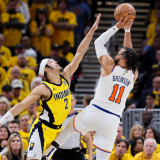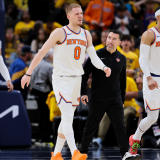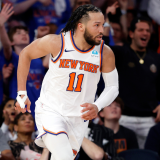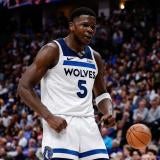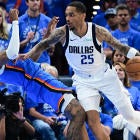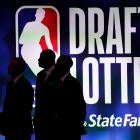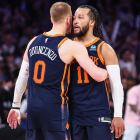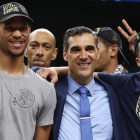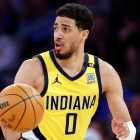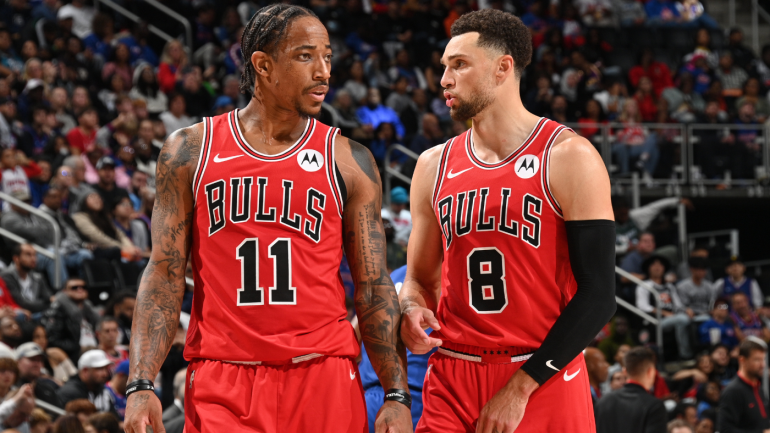
Dec. 15 is upon us, and with it, the unofficial beginning of the 2023-24 NBA trade season. As of Friday, the majority of players who signed new deals in free agency last summer are eligible to be dealt. A few key teams—the Lakers chief among them—are still out of the fray until January, but for most of the league, Friday is the starting gun. Teams are no longer tethered to their free agents. Their matching salary is available to be moved. They have 25 games or so of data on their teams and know what they need.
We're still about two months away from the trade deadline itself. Things are going to change between now and Feb. 8. Nobody expected Kevin Durant to get traded last December, for instance, or James Harden a year earlier. But trade deadlines tend to revolve around a small group of teams, a few key sellers that control the player pool and a few key buyers with the resources to nab the best ones available. More teams will involve themselves, and for all we know, these teams will stand pat. But with trade season now at hand, these are the five teams that appear likeliest to control the 2023-24 market.
1. Chicago Bulls
For years the question was "how much can the Bulls get for Zach LaVine?" It's now increasingly feeling like that should be amended to "can the Bulls get off of Zach LaVine's contract quickly enough?" The Lakers appear to be the only serious suitor so far. They're a month away from being able to match money here, and even when they can, the LaVine we've seen so far this season isn't so far ahead of D'Angelo Russell that they should be all that eager to throw significant draft capital at Chicago. LaVine is a one-way player with four years of max money hitting the market at a moment in league history that has never been less favorable to that specific archetype. We're in the second apron era here. Unless LaVine proves he's healthy and close to the player he was two years ago, there's not going to be much of a market here.
Are the Bulls even going to put him back on the court before the trade deadline? Chicago is now 5-2 since he went down. Coby White is quickly becoming a reasonable enough facsimile—it's hard to argue with 26 points per game in his last seven for a player earning less money over the next three years than LaVine will earn this season alone. White won't make the Bulls a contender, but since when is that their goal?
Chicago's dedication to directionless is going to throw a real wrench into this trade market, because the Bulls have the players to satisfy almost any sort of trade partner. Everyone wants Alex Caruso. He might be the best guard defender in the NBA and he's not even earning eight figures. Any contender can match money in a trade for him. If his shooting holds up he can fit on any offense. Even if it doesn't, he's a deceptively valuable screener and connector that amplifies high-IQ players on offense. There's a reason LeBron James loved playing with him. He'd net at least one good first-round pick in a trade. Potentially two. The Bulls, for now, appear to be rebuffing all offers, because hey, when you have the chance to preserve a team on pace to win 32 games, you've gotta do it.
DeMar DeRozan is far more gettable, especially as extension talks have seemingly sputtered. Matching money on him is trickier. The sort of teams that could use a mid-range specialist for the highest levels of postseason are rarely the sort of teams that have $28 million in tradable salary lying around. One of his preferred destinations, the Heat, happen to have such a contract to deal in Kyle Lowry. They're the sensible fit here.
Jevon Carter can be someone's discount-bin Caruso. The Bucks would absolutely love to have him back. Enough contenders need a backup center for someone to give up a couple of second-rounders for Andre Drummond. Nobody should consider doing so for Nikola Vucevic, who has three years of starter money left on one of the most bizarre contracts in recent memory. There's enough here to kickstart a modest rebuild. More likely, the Bulls just slash payroll and try to trot out another 10-seed, but perhaps the right offers could show them the light.
2. Toronto Raptors
Don't you dare try to predict the Raptors. Just when we thought they'd finally break up their "everyone is 6-foot-8" roster last February, they zagged and gave up a first-round pick for Jakob Poeltl. If this were a normal team, that pick would be informing every decision they make for the next seven weeks. It's currently in line to fall at No. 11 overall. It's also top-six protected. It's probably in Toronto's best interest to try to tank its way into keeping that pick. It was also probably in Toronto's best interest not to trade that pick in the first place, but the Raptors haven't had a discernible long-term plan since Kawhi Leonard left.
Here's what we do know: Pascal Siakam and OG Anunoby will both be free agents this offseason. Both will command near-max salaries. Scottie Barnes will join them two summers from now when his anticipated max deal kicks in. The Raptors are now 10-14 with that trio as the core of the roster. Is ownership going to want to make the financial commitment necessary to keep such a team together? Don't bet on it.
Siakam is 30 in April and posting Westbrookian 3-point shooting numbers. He appeals to the small group of teams—Atlanta, Indiana, maybe Golden State?—with enough spacing to maximize his inside-the-arc offense and benefit from his defense. Anunoby is 26, makes his 3s and might be the best man-to-man perimeter defender on the planet. He's the rich man's Caruso, and plenty of teams tried throwing hefty pick packages at the Raptors a year ago to nab him. They didn't bite.
They probably don't this season. A Siakam trade seems increasingly inevitable, but moving Anunoby as well probably represents their best chance at keeping that impending lottery pick, and as much as either of those veteran forwards might return in a deal, neither is likely to offer the long-term upside of a top-six pick. With the way Barnes is developing this season, they might not have many more chances at a pick that high. Logic would dictate they do everything in their power to keep it, but if logic controlled what the Raptors did, they wouldn't have given the pick away in the first place.
3. Utah Jazz
The Jazz overperformed last season. It showed in how they approached the offseason. The John Collins acquisition was one thing. They had to do something to reach the salary floor, after all. But their stealth pursuit of Jrue Holiday hinted at a more serious desire to win now. You don't give up multiple first-round picks for a 33-year-old as a long-term play. But things have normalized for this year's group. The Jazz are on a 30-win pace, exactly the sort of middle ground Danny Ainge teams typically try to avoid.
Ainge's presence injects some badly needed unpredictability into this deadline. The man who traded Kevin Garnett and Paul Pierce will trade anyone. Lauri Markkanen's name is sneaking into trade rumors lately. He's at the absolute peak of his value right now, putting up numbers he couldn't on a better roster while earning a well below-market salary. If Ainge thinks this team needs the tank it was gearing up for before last year's surprise, he might just pull the plug. Markkanen is far better suited to the sort of secondary role a contender could offer him. In Utah, all he's really doing is propping up a low-ceiling team.
Could the Jazz go the other way? Sure. A real floor general would go a long way here, as Utah's platoon of combo guards hasn't been able to replicate what Mike Conley did before last season's trade deadline. The Jazz take enough 3s to feasibly accommodate Siakam, though not with Collins on the roster. The Jazz are reportedly already open to trading him, and with good reason. His own shooting has never recovered and he's not nearly as bouncy as he was at his Atlanta peak.
There are plenty of players here that could help winners without much to trade. Jordan Clarkson and Kelly Olynyk probably aren't fetching first-round picks at this point. Both fill valuable contender niches. They're both getting in the way of minutes for youngsters as well. But the Jazz, like the Raptors, haven't settled on a path yet. Ainge isn't going to wait forever.
4. Philadelphia 76ers
It's not often that a team's control over a deadline can be measured in the moves it doesn't make, but that's where we stand with Philadelphia. The 76ers, right now, are positioned to generate nearly limitless cap space this offseason. That will remain true so long as they don't add long-term money. The last thing that teams with key free agents want—specifically the Raptors—is to go into an offseason having to compete with Daryl Morey and Joel Embiid just to keep their own players.
Can Morey weaponize that? It's tricky but possible. Say he does get into a negotiation with Toronto for one of its forwards. The threat of him hanging up and swiping that player for nothing in July would surely drive the price down to some extent, wouldn't it? Perhaps it's a threat that can be weaponized in other ways. "We're going to sign Free Agent X away from you this summer, but you could take away some of our cap space now by trading us Player Y instead." It's a delicate dance. Morey, one of the NBA's most creative cap minds, is well-equipped for it.
Of course, the 76ers could just as easily go the conventional route and simply try to add good players. It's a more plausible approach than it would be for typical Morey teams. He's typically short on assets because of his superstar pursuits. Dealing James Harden refilled the coffers, and the 76ers don't appear desperate to replace his star power. Another perimeter defender (Caruso?) and perhaps more of a distributing guard to take some pressure off of Tyrese Maxey (Tyus Jones?) make plenty of sense here.
But that threat of a cap space retool over the summer is what makes the 76ers so compelling right now. They could go all in to try to win the 2024 championship. They could wait it out and emphasize 2025 and 2026. They could try to balance the two agendas by targeting low-cap hold 2024 free agents that can help now without costing much space later. It's rare for a win-now team to have this much optionality, and Morey is going to maximize it.
5. Oklahoma City Thunder
After years of dormancy, the boogeyman is finally ready to crawl out the 29 closets it's been hiding in and ruin everybody's trade fun. The Thunder are not just a buyer. They're a monopoly, the sole proprietor of this trade market by virtue of their unprecedented collection of draft picks and young talent. No trade can be made without their tacit approval because no competitor has the means to outbid them for any player on the market. If the Thunder decide they want someone, they can get them. There is nothing your favorite team can do about it except hope that Sam Presti decides to direct his assets elsewhere.
He's hoarded them thus far. He may well continue to do so. The Thunder don't have many weaknesses. They never get rebounds, but that is to some extent by design. At least seven spots in the rotation are stone-cold locks. Nothing is dislodging Shai Gilgeous-Alexander, Chet Holmgren, Jalen Williams, Josh Giddey, Lu Dort, Cason Wallace or Isaiah Joe. Those last few reserve spots are up for grabs, but the Thunder have so many young players theoretically capable of growing into them that they might not even bother trying for a veteran. Who would they even pursue? A stretch big man to back up Holmgren would be nice. The offense wilts when Gilgeous-Alexander goes to the bench, so perhaps another shooting ball-handler to ease Giddey's backup point guard burden could help. You can never have too many wings.
There's plenty of tradable salary in that deep bench morass they'd probably like to improve upon. Combining Davis Bertans and Vasilije Micic alone gets you to over $27 million in matching salary. We're nearing "use it or lose it" time with Oklahoma City's spare money. The Thunder aren't adding any contracts that extend beyond the 2025-26 season, when the bill comes due on hefty extensions for Holmgren and Williams. Oklahoma City will be a tax team at that point. Their ownership has bitten that bullet before, and a shiny new arena certainly won't hurt if they have to do it again. But we're not talking about New York or Los Angeles here. The Thunder have revenue limitations based on their market. They're not paying to keep their core four and a fifth near-max player for the long haul. Perhaps Giddey's shooting limitations make him expendable for the right star-level piece. More likely, the Thunder are looking for players on shorter-term deals that can help now.
Who could that be? Well ... anyone, as we covered. Oklahoma City has access to players that the majority of the league doesn't by virtue of its pick stockpile. Short of a dozen or so superstars, there really isn't a player in the league they can't get if they want him badly enough. Presti can do whatever he wants, and that should terrify every other front office in the NBA.








